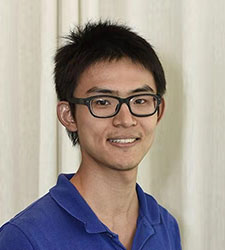Associate Professor, Department of Molecular and Human Genetics
Clinical Laboratory Director, Human Genome Sequencing Center
Contact Information
 Education
Education
B.S., College of Life Sciences, Nankai University, Tianjin, China, 2009
Ph.D., Graduate Program in Integrative Molecular and Biomedical Sciences, Baylor College of Medicine, 2015
Research Associate, Baylor College of Medicine, 2015-2016
Fellowship, ABMGG Clinical Cytogenetics/Molecular Genetics, Baylor College of Medicine, 2016-2019
Certification
- Diplomate of the American Board of Medical Genetics and Genomics
- Clinical Cytogenetics
- Clinical Molecular Genetics
Professional Organizations
- 2019-present - Fellow, American College of Medical Genetics and Genomics
- 2013-present - Member, American Society of Human Genetics
- 2018-present - Member, American College of Medical Genetics
Awards
- 2018 - ASHG Charles J. Epstein Trainee Award for Excellence in Human Genetics Research Semifinalist
- 2018 - ACGA Trainee Award for Postdoctoral Translational/Clinical Research
- 2014 - BCM IMBS Graduate Program Claude W. Smith Fellowship Award
Research Interests
I am a board-certified Clinical Molecular Geneticist and Clinical Cytogeneticist specialized in genomic data interpretation and clinical test development and implementation. My primary clinical focuses are on analysis, interpretation and reporting of health-related genomic variations, and development and implementation of clinical-grade cytogenetic and molecular methodologies to support diagnosis of human genetic diseases. My research interests range from basic mutagenic mechanisms that generate genetic/genomic variants to clinical manifestations of these variation. The interplay between my clinical and research roles offers me unique opportunities to conduct clinical research on discovering and deciphering new mechanisms of human genetic disorders, and investigating, developing and implementing tools to improve molecular diagnostics and genomic data interpretation.
Human genome is susceptible to rearrangement. This is largely attributed to its complex genomic architecture. Studies focusing on the origin of complexity of the human genome and the mutagenic models of rearrangements have provided fundamental understanding of the evolution and variation of the human genome. My research on the human genome rearrangements have contributed to (1) origin of complex genomic architecture with a focus on the dynamic changes of low copy repeats (LCRs) during primate evolution; (2) mutagenic mechanisms of recurrent CNVs (e.g. non-allelic homologous recombination), nonrecurrent CNVs, complex genomic rearrangements (e.g. replication-based mechanisms, Alu-Alu mediated rearrangement) and extreme phenomena such as multiple de novo CNVs; (3) discovery, characterization, and definition of new genomic disorders (e.g. XLAG [MIM# 300942], YUHAL [MIM# 616652]); (4) mosaicism, which has significant impact on clinical manifestation variability and recurrence risks; and (5) mechanisms contributing to variable penetrance of genomic disorder, such as identification of Mendelizing variants leading to recessive traits.
The advancement of genomic technologies has drastically enhanced the resolution of genomic variant interrogation and exponentially expanded our knowledge of the interaction between genomic variations and human health from both clinical and research perspectives. For example, using exome sequencing, we have identified variants in new genes associated with Cornelia de Lange Syndrome (CdLS) or CdLS-like phenotypes (e.g. ALYUS [MIM# 617126]), BAFopathies, chromatinopathies, and transcriptomopathies. New gene discoveries like these have contributed to the missing hereditary of undiagnosed patients. Equipped with these high-resolution large-scale genomic tools, we are able to perform comprehensive studies to better understand the reasoning behind phenotype variability and locus heterogeneity. Lessons learned from these research studies, in return, advance our clinical practices in medical genetics and improve patient care.